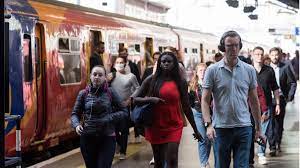On the first day of Britain’s biggest rail strike in 30 years, tens of thousands of workers walked out, causing significant disruption to passengers as both the unions and the government vowed to stick to their guns in a pay dispute.
Some of the more than 40,000 train workers set to strike on Tuesday, Thursday, and Saturday arrived along picket lines as early as sunrise, causing widespread disruption and leaving key stations vacant. Due to a second strike, the London Underground metro was also mostly shut down.
Under pressure to do more to help Britons enduring the worst economic downturn in decades, Prime Minister Boris Johnson warned the strike would hurt businesses still recovering from COVID.
The rail strikes, according to unions, could be the start of a “summer of discontent,” with teachers, doctors, waste disposal employees, and even barristers considering strike action as inflation approaches 10%.
Mick Lynch, secretary-general of the Rail, Maritime and Transport Workers, told Sky News, “The British worker needs a pay boost.” “They require job stability and reasonable working conditions.”
Roads were busier than usual with automobiles, cyclists, and pedestrians during morning rush hour. Some hospital employees stated they slept at work overnight to keep care going.
Johnson informed his cabinet that the strikes were “wrong and unnecessary,” and that his message to the country was that they needed to be prepared to “stay the course” because changes to railway operations were in the public’s best interests.
A study conducted by pollsters YouGov earlier this month found public opinion to be split, with over half of those polled opposing the measure and slightly over a third supporting it.
Leo Rudolph, a 36-year-old lawyer who walked to work, said the longer the debate goes on, the more irritated he will grow.
FEVER OF INFLATION
Inflation has skyrocketed across Europe as a result of soaring energy prices, and Britain is not alone in experiencing labor unrest.
Belgium’s cost-of-living protests produced chaos at Brussels Airport on Monday, while Germany’s most powerful union is asking for big salary rises, and President Emmanuel Macron is facing opposition in France over pension reforms.
The British economy originally bounced back strongly after the COVID-19 epidemic, but a combination of labor shortages, supply chain disruption, inflation, and post-Brexit trade issues have sparked recession predictions.
The government claims to be helping millions of the poorest families but also warns that pay increases beyond inflation will harm the economy’s fundamentals and prolong the crisis.
During the epidemic, Britain’s railways were virtually nationalized, with train operating companies paying a fixed charge to run services and state-owned Network Rail managing the lines and facilities.
The RMT seeks a salary increase of at least 7% for its members, but Network Rail has only offered 2%, with another 1% tied to industry reforms that the RMT opposes. The government has been chastised for not participating in the negotiations. Ministers claim that unions must deal directly with businesses to settle the issue.
The outbreak of strike action has been compared to the 1970s when Britain saw extensive labor unrest, particularly the “winter of discontent” in 1978-79.
Since the 1970s, the number of British workers who belong to a trade union has about halved, and walkouts have become considerably less regular, thanks in part to reforms enacted by former Prime Minister Margaret Thatcher to make calling a strike more difficult.
The government says it will modify the law as soon as possible to require railway operators to provide a certain level of service on strike days and to allow firms to hire temporary workers.
The strikes come as passengers face hectic delays and last-minute cancellations at British airports due to staff shortages, and the health service is straining under the weight of huge waiting lists accumulated during the pandemic.


















